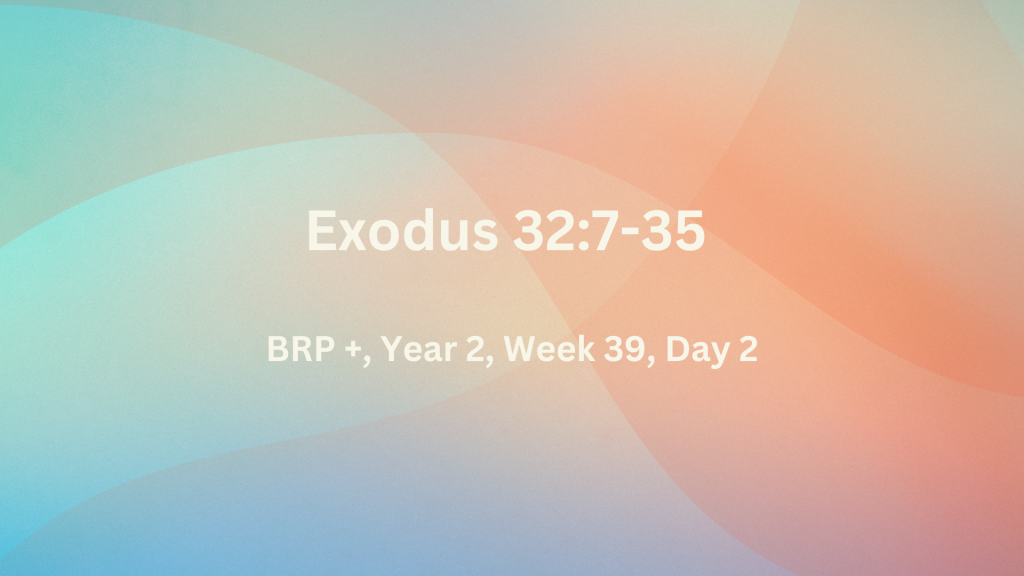Exodus 32:7-35
Q.1. When did Moses find out about Israel’s idolatry? Why did God refrain from destroying Israel? Did God change His mind? – (Exo.32:7-14)
Moses was told by the Lord about Israel’s idolatry while still on Mount Sinai (Exo.32:8). God made an offer to Moses that few mortals would have been able to refuse, when He said – Let Me alone that My anger may burn against them and that I may destroy them; and I will make of you a great nation (Exo.32:10). However, it seemed inconceivable to Moses that the omniscient and sovereign Lord would lead Israel out of Egypt, only to destroy them (c.f. Exo.32:11). Moses wasn’t tempted for a moment. He argued – Why should the Egyptians speak, saying, ‘With evil intent He brought them out to kill them in the mountains and to destroy them from the face of the earth’? Turn from Your burning anger and change Your mind about doing harm to Your people (Exo.32:12). He reminded the Lord of His promises to his forefathers Abraham, Isaac, and ISRAEL (Exo.32:13). Because Moses was more concerned for God’s fame than his own – the Lord changed His mind about the harm which He said He would do to His people (Exo.32:14). DOES GOD CHANGE HIS MIND? God does not change His mind in an eternal sense. However, the Bible implies that He changed what He threatened to do in a temporal sense. We know that God has, from all eternity, ordained whatever comes to pass because He works all things after the counsel of His will (Num.23:19-20; Job.42:2; Isa.14:27; 43:13; 46:9-11; Eph.1:11). Nevertheless, when He deals with people, it was recorded that God did not follow through with His warnings when people repented. God told Jeremiah – If that nation against which I have spoken turns from its evil, I will relent concerning the calamity I planned to bring on it (Jer.18:8). The reason why the prophet Jonah became very angry was because God did not destroy Nineveh after they repented (Jon.4:1-3). God often warns sinners of pending judgment. Yet when sinners repent, He leaves room to withhold the judgment that we so rightfully deserve. He is a God of mercy and grace.
Q.2. What was unique about the Tablets of Stone? How did Moses display his righteous anger? Was Aaron’s explanation true? – (Exo.32:15-24)
Jews were encouraged to memorize the whole Pentateuch i.e. the first five books of Moses. However, only the Ten Commandments were written by God directly – 15 Then Moses turned and went down from the mountain with the two tablets of the testimony in his hand, tablets which were written on both sides; they were written on one side and the other. 16 The tablets were God’s work, and the writing was God’s writing engraved on the tablets (Exo.32:15-16 c.f. Exo.31:18; Deut.4:13; 10:4). These ten commands are repeated in the New Testament, and under the New Covenant, these laws are written on our hearts and in our minds (c.f. Heb.8:10; 10:16). As Moses and Joshua came down from the mountain, they heard a commotion. When Moses – saw the calf and the dancing, Moses’s anger burned, and he threw the tablets from his hands and shattered them … (Exo.32:19 c.f. Exo.32:17-18). He then ground the golden calf to powder, poured it on their water, and made the people drink it (Exo.32:20). Aaron’s explanation that the people made him do it – and out came this calf (Exo.32:24), was only partly true (Exo.32:21-24). Aaron was weak and would have been better to admit his great guilt.
Q.3. Was the action of Moses justifiable? Who stood with him? How did God respond to the intercession of Moses? – (Exo.32:25-35 c.f. Exo.20:23)
God gave Israel the Ten Commandments before He wrote them on the stone tablets (c.f. Exo.19:16-25; 20:18-21). They had been specifically warned about idolatry – You yourselves have seen that I have spoken to you from heaven. You shall not make other gods besides Me; gods of silver or gods of gold … (Exo.20:22-23). The Covenant had been sealed in blood, and the elders had eaten and drunk in the awesome presence of God (Exo.24:6-11). Then the Lord had called Moses up Mount Sinai where he had stayed forty days and nights … and was given the Stone Tablets of the Ten Commandments (Exo.24:18; 43:28 c.f. Exo.34:12-18). Israel’s breaking of the Covenant demanded drastic action, and Moses shouted – Whoever is for the Lord, come to me! (Exo.32:26). They were either for God or against Him. The tribe of Levi, to whom Moses and Aaron belonged, stood with him to a man (Exo.32:26 c.f. Deut.33:8-9). He spoke on behalf of God – “Thus says the Lord, the God of Israel, ‘Every man of you put his sword upon his thigh and go back and forth from gate to gate in the camp, and kill every man his brother, and every man his friend, and every man his neighbour.’” (Exo.32:27). As a result of the direct command of the Lord, the tribe of Levi slew some three thousand men (Exo.32:28). Moses called on the people to dedicate themselves to the Lord – in order that He may bestow a blessing upon you today (Exo.32:29). Because of the greatness of Israel’s sin Moses went up to the Lord to somehow make atonement for their sin (Exo.32:30). He tried to bargain with God to forgive Israel’s sin – and if not, please blot me out from Your book which You have written (Exo.32:32). However, God told Moses – Whoever has sinned against Me, I will blot him out of My book (Exo.32:33 c.f. Rev.13:8; 17:8; 20:12 & 15). Moses was told to continue leading the people, but not without angelic assistance (Exo.32:34 c.f. Mt.18:10; Heb.1:14). God then exacted further carnage on the people who had worshiped the golden calf that Aaron had made (Exo.32:35).

